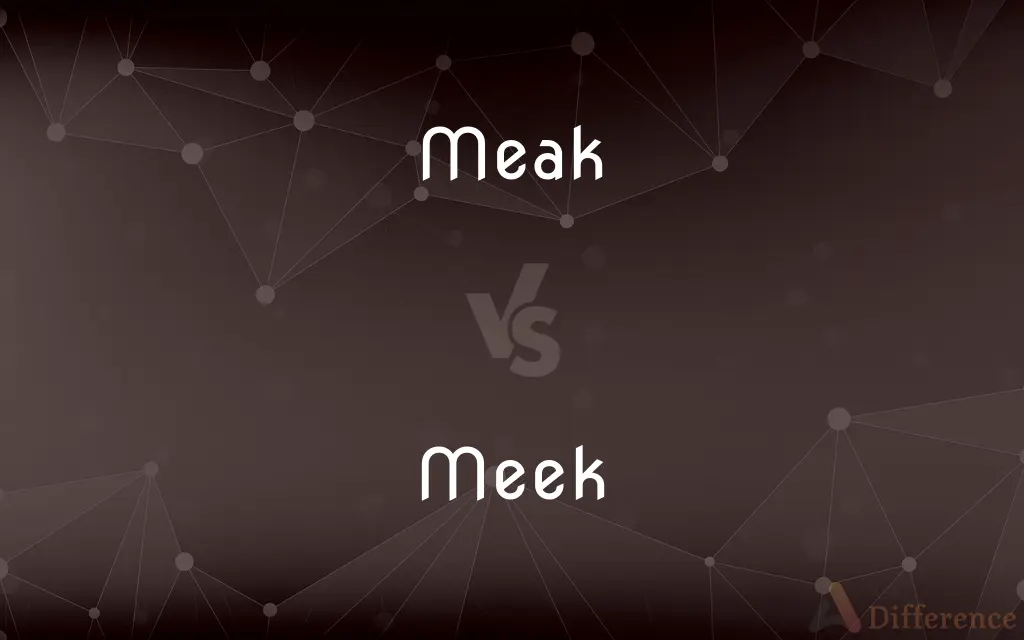Meak vs. Meek — What's the Difference?
Edited by Tayyaba Rehman — By Urooj Arif — Updated on March 27, 2024
"Meak" is often a misspelling of "meek," which describes a person who is gentle and submissive.

Difference Between Meak and Meek
Table of Contents
ADVERTISEMENT
Key Differences
"Meak" is not a recognized word in standard English dictionaries, and it is typically considered a typographical error for "meek." Whereas "meek" refers to someone who is patient, gentle, and not inclined to anger or resentment, often seen as a positive trait in many cultural and religious contexts.
While "meak" does not have an established definition or usage in English, "meek" carries significant connotations of humility and quiet strength. Individuals described as meek are often perceived as being peaceful and self-controlled, rather than weak or fearful.
In literature and common usage, "meek" is frequently associated with a virtuous quality, admired in characters who exhibit restraint and compassion in the face of adversity. On the other hand, "meak," being a likely misspelling, does not contribute to character descriptions or narrative elements.
The misunderstanding between "meak" and "meek" highlights the importance of accurate spelling in conveying the intended meaning. While "meek" enriches language with its deep connotations, incorrect spelling can lead to confusion and misinterpretation.
Correct usage of "meek" demonstrates not only grammatical accuracy but also an understanding of the nuances of English vocabulary. In contrast, awareness of common misspellings like "meak" is crucial for effective communication and clarity in writing.
ADVERTISEMENT
Comparison Chart
Definition
Likely a misspelling.
Describes a gentle, submissive, and patient person.
Usage
Incorrect in English.
Widely used to denote humility and gentleness.
Connotations
None, due to being a misspelling.
Associated with virtues like humility and patience.
Literary Role
Not applicable.
Often admired in literary characters.
Spelling
Common error for "meek."
Correct spelling with significant meanings.
Compare with Definitions
Meak
A hook with a long handle; scythe.
Meek
Showing patience and humility; gentle.
Meak
A hook with a long handle.
Meek
Easily imposed on; submissive.
Meek
Humble, non-boastful, modest, meager, or self-effacing.
Meek
Submissive, dispirited.
Meek
(US) (of horses) To tame; to break.
Meek
Mild of temper; not easily provoked or orritated; patient under injuries; not vain, or haughty, or resentful; forbearing; submissive.
Now the man Moses was very meek.
Meek
Evincing mildness of temper, or patience; characterized by mildness or patience; as, a meek answer; a meek face.
Meek
To make meek; to nurture in gentleness and humility.
Meek
Humble in spirit or manner; suggesting retiring mildness or even cowed submissiveness;
Meek and self-effacing
Meek
Very docile;
Tame obedience
Meek as a mouse
Meek
Evidencing little spirit or courage; overly submissive or compliant;
Compliant and anxious to suit his opinions of those of others
A fine fiery blast against meek conformity
She looked meek but had the heart of a lion
Was submissive and subservient
Common Curiosities
How is "meek" used in literature?
In literature, meek characters are often portrayed as virtuous, demonstrating strength through gentleness.
What does "meek" mean?
"Meek" describes someone who is gentle, humble, and submissive, often considered a virtue.
Is there a difference between being meek and weak?
Yes, meekness is associated with humility and self-control, not weakness or lack of courage.
Is "meak" a word?
"Meak" is generally considered a misspelling of "meek."
How can one correctly use "meek" in a sentence?
"She was admired for her meek and gentle approach to teaching."
Can "meek" have negative connotations?
Sometimes, it may be misinterpreted as a lack of confidence or assertiveness.
Why is it important to distinguish between "meak" and "meek"?
Correct spelling ensures clear communication and preserves the intended meaning.
Can being meek be a positive trait?
Yes, being meek is often viewed positively, associated with humility and patience.
How can being meek affect one's relationships?
A meek person may foster peaceful and respectful relationships.
Can "meek" be used to describe actions?
Yes, actions can be described as meek if they are performed with gentleness or humility.
Is "meek" only used in religious contexts?
While common in religious texts, "meek" is also widely used in secular contexts.
How does understanding "meek" contribute to language learning?
It enriches vocabulary and aids in understanding nuanced character traits.
What is the opposite of "meek"?
Aggressive or domineering are often considered opposites of "meek."
Why might someone mistakenly write "meak" instead of "meek"?
Spelling errors or misunderstandings can lead to common misspellings like "meak."
Is "meek" an outdated concept?
No, the qualities it represents are timeless and continue to be valued.
Share Your Discovery

Previous Comparison
Annoyed vs. Angry
Next Comparison
Monera vs. ProtistaAuthor Spotlight
Written by
Urooj ArifUrooj is a skilled content writer at Ask Difference, known for her exceptional ability to simplify complex topics into engaging and informative content. With a passion for research and a flair for clear, concise writing, she consistently delivers articles that resonate with our diverse audience.
Edited by
Tayyaba RehmanTayyaba Rehman is a distinguished writer, currently serving as a primary contributor to askdifference.com. As a researcher in semantics and etymology, Tayyaba's passion for the complexity of languages and their distinctions has found a perfect home on the platform. Tayyaba delves into the intricacies of language, distinguishing between commonly confused words and phrases, thereby providing clarity for readers worldwide.














































